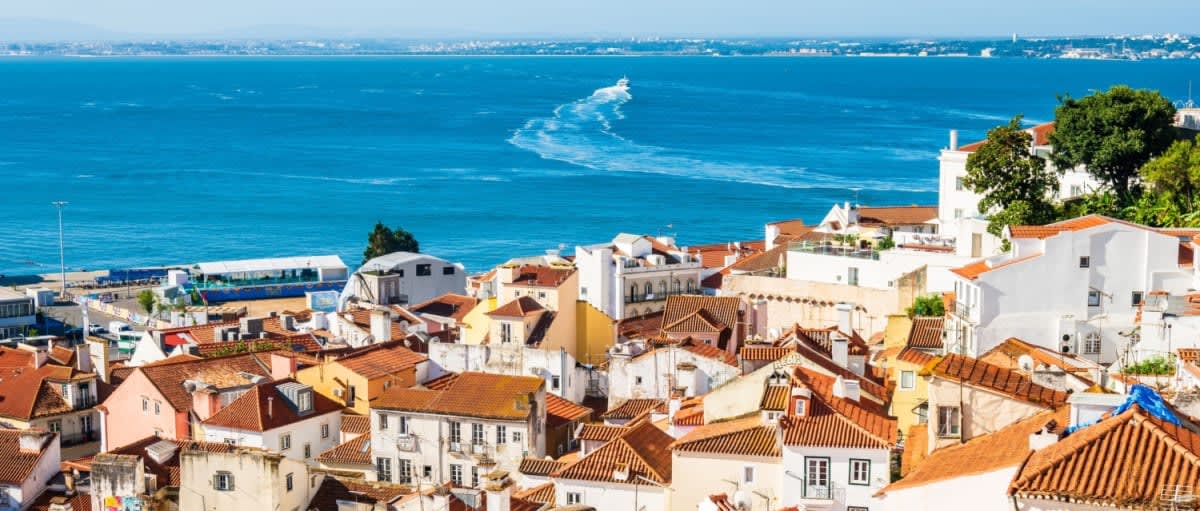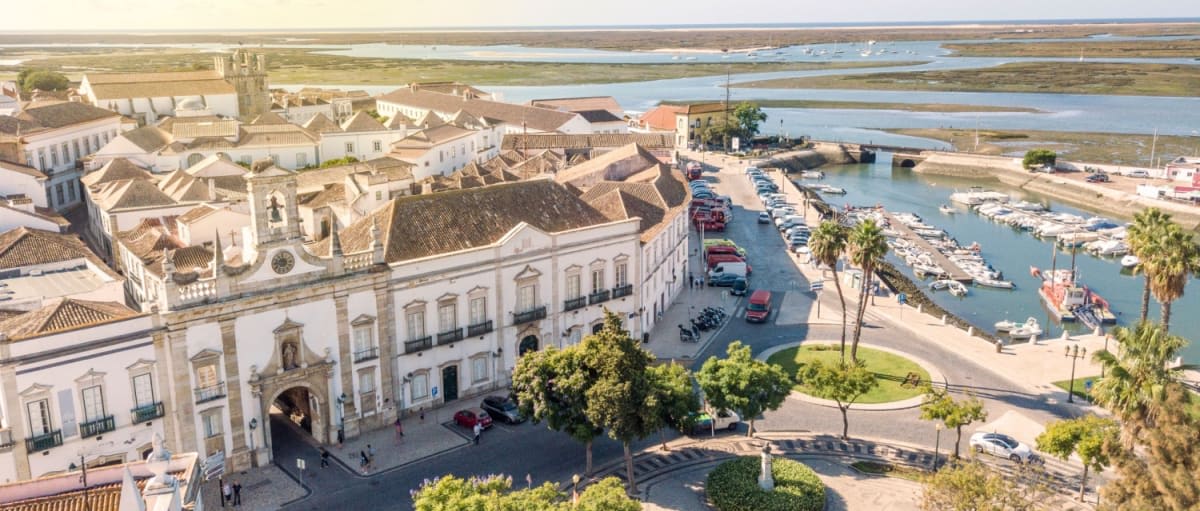Portugal’s vibrant capital combines centuries of heritage with global-city energy – all bathed in Atlantic light and set against the Tagus River. Buying a property in Lisbon means owning a home in one of the oldest cities in Europe. Today the city stands as a cosmopolitan hub of culture, commerce and creativity. From cobbled medieval streets and hilltop viewpoints to beachside suburbs and high-rise riverside apartments, the Lisbon offers a rich mix of neighbourhoods and lifestyles – all within a highly liveable climate.
Whether you’re a digital nomad, lifestyle investor, retiree, or remote-working family, Lisbon’s appeal is clear: it’s safe, sunny, well connected and packed with personality. You’ll find strong long-term rental demand, stable capital growth, and a property market that continues to attract international buyers looking for charm, convenience and coastal access.
In this article, we explore Lisbon’s most popular districts, typical property types, costs, and the process of buying – so you can make an informed decision about finding your place in Portugal’s most iconic city.
Download the Portugal Buying Guide
Contents
- Why buy property in Lisbon?
- Property types and what you can get for your money
- Best neighbourhoods to buy property in Lisbon
- Lifestyle, climate and culture
- Year-round appeal and long-term potential
- Ownership costs and ongoing expenses
- How to buy property in Lisbon
- Start your property journey in Lisbon
- FAQs about buying property in Lisbon

Why buy property in Lisbon?
Lisbon is not just Portugal’s capital – it’s one of Europe’s most exciting cities to live, invest and retire in. As a global city with deep historic roots, it offers a compelling mix of old-world beauty and modern infrastructure. With around 3 million people in its wider metropolitan area, Lisbon accounts for nearly a third of Portugal’s population and economic activity.
The property market here is dynamic and internationally appealing. Foreign buyers are drawn by the lifestyle, climate, and cityscape – while investors appreciate Lisbon’s status as a tech and tourism hub, supported by international schools, transport links and EU residency options.
Lisbon is also a relatively safe capital to invest in, with stable governance, a transparent legal system and no restrictions on foreign ownership. Despite rising prices, it still offers better value than other Western European capitals – particularly when looking at restored character apartments, riverfront developments or buy-to-let opportunities in growing districts.
Whether you’re searching for a pied-à-terre, a relocation base, or a smart investment in a city that still feels deeply human, Lisbon makes a persuasive case.
For a closer look at the whole purchase process, claim your free copy of our Portugal Buying Guide:
Download the Portugal Buying Guide
Property types and what you can get for your money
Lisbon offers a wide mix of property styles to suit a range of budgets and buyer priorities. From renovated Pombaline apartments in the historic centre to sleek new builds in riverside Parque das Nações, there’s no single Lisbon market – rather, a collection of micro-neighbourhoods each with their own appeal.
In central districts like Alfama, Bairro Alto, and Chiado, expect to find period buildings with high ceilings, decorative tiles, and wrought-iron balconies. Prices in these areas are among the highest, often starting at €500,000 for a one-bedroom and climbing into the millions for large penthouses or prime-view homes. Some are tightly restricted by local heritage rules, so renovation opportunities are limited but valuable.
More affordable options exist in up-and-coming districts like Beato and Alcântara, where old warehouses and industrial buildings have been transformed into lofts, duplexes and modern flats – ideal for buyers seeking long-term growth and rental demand.
Further out, areas like Benfica or Marvila offer family-sized apartments from under €300,000, often with balconies and parking. New developments with energy efficiency and shared amenities are increasingly popular with remote workers and expats looking for modern convenience and value.
Whether you’re investing or relocating, Lisbon’s property market offers character, variety and capital appreciation potential.
Best neighbourhoods to buy property in Lisbon
Lisbon is a city of neighbourhoods – each with its own character, architecture and pace. Whether you’re looking for old-world charm, urban convenience, riverside living or creative regeneration, there’s a bairro to match your priorities.
Alfama is the city’s oldest district, known for its narrow cobbled lanes, Fado bars, and hilltop views. Properties here are full of charm and history, with tiled facades and wrought-iron balconies. It’s perfect for lifestyle buyers, though heritage restrictions can limit renovation flexibility.
Bairro Alto and Chiado offer a livelier urban atmosphere, mixing nightlife, theatres and boutique shopping. Apartments here can be expensive but are in demand among tourists and expats, making them strong rental performers.
Alcântara and Beato are regeneration hotspots. With riverside warehouses turned into galleries, coworking spaces and lofts, these areas are popular with young professionals and creative entrepreneurs. Properties here often offer better value and growth potential.
Parque das Nações is Lisbon’s most modern district. Think glass-fronted apartments, green spaces and riverfront promenades – ideal for those seeking comfort, parking and newer construction.
Other popular areas include Estrela for leafy avenues and embassies, and Graça or Marvila for up-and-coming charm with capital appreciation potential.
Lifestyle, climate and culture
Lisbon is a capital that lives outdoors. With over 2,800 hours of sunshine a year and mild winters, the climate supports a relaxed, sociable lifestyle – from café terraces and miradouros (viewpoints) to riverside cycling and long seafood lunches by the sea.
The city’s Mediterranean feel is matched by Atlantic influence. Summers are hot and dry, with breezes from the coast, while winters are cool and rainy, but rarely cold. With temperatures rarely dipping below 10°C, Lisbon is a year-round city where life carries on comfortably in every season.
Culturally, Lisbon blends centuries of heritage with cutting-edge design. Historic tramlines pass tile-covered townhouses, while new galleries, concert halls and creative districts add a contemporary pulse. You’ll find everything from fado bars and open-air cinemas to international film festivals, art biennales and global music acts.
Food is central to Lisbon’s identity. Whether it’s a pastel de nata in Belém, a bacalhau dish in Alfama or fusion cuisine in Beato, dining is affordable, diverse and consistently excellent. The city is walkable, welcoming and increasingly multilingual, with a strong international community and a laid-back pace that invites you to stay longer than planned.
Year-round appeal and long-term potential
Lisbon isn’t just a summer destination – it’s a thriving year-round capital with a strong economy, growing population and expanding international profile. With over 3 million people in the wider metropolitan area, it’s the cultural, political and business heart of Portugal.
The city’s appeal goes beyond tourists. Lisbon is a magnet for remote workers, entrepreneurs and international students, with a strong digital infrastructure, co-working culture and world-renowned events like Web Summit. Its global status brings steady rental demand and makes it one of Portugal’s most reliable markets for long-term investment.
Property here is especially attractive for those seeking income potential. Long lets, student housing, and short-term holiday rentals (in areas where permitted) all perform well – particularly in well-connected neighbourhoods like Avenidas Novas, Alcântara and Parque das Nações.
Lisbon also benefits from Portugal’s residency and visa pathways, which have historically attracted foreign investors. While Golden Visa rules are evolving, Lisbon remains a focal point for international buyers drawn to its blend of urban buzz, coastal beauty and long-term stability.
Whether you’re buying to live, let, or a little of both, Lisbon offers one of Europe’s strongest city-living propositions.
Ownership costs and ongoing expenses
Compared to other European capitals, Lisbon offers relatively low annual property costs – but it’s still important to factor in all recurring expenses when budgeting for a home here.
All owners pay IMI (Imposto Municipal sobre Imóveis), a municipal property tax based on the property’s tax value. Rates range from 0.3% to 0.45% annually for urban properties, though exemptions are available for energy-efficient or low-value homes. You may also encounter a stamp duty on your purchase and an annual wealth tax on properties valued above €600,000 (or €1.2 million for couples).
Other costs include condominium fees (for shared buildings), home insurance, utilities, and maintenance. If you plan to let the property short-term, be aware that licensing rules in Lisbon are evolving and subject to local council approval. Letting platforms may also charge service fees.
If you’re buying from abroad, fluctuating exchange rates can also impact your ongoing payments. For predictable budgeting, many buyers choose to use a currency forward contract to lock in an exchange rate for major transfers like deposits and renovation work.
Overall, Lisbon offers good value, but like any property purchase, full transparency on costs is key to a smooth and confident investment.
How to buy property in Lisbon
Buying property in Lisbon is a straightforward process for international buyers – but it helps to understand the key steps before you begin.
First, you’ll need to obtain a NIF (Número de Identificação Fiscal) – a Portuguese tax number – which is essential for any financial transaction in Portugal. You’ll also need a Portuguese bank account to handle payments. Many buyers choose to work with a local lawyer to assist with due diligence and to ensure contracts are correctly reviewed.
Once you’ve found a property, you’ll sign a promessa de compra e venda (preliminary contract) and typically pay a 10% deposit. This agreement sets out the terms and timeline for the sale. Completion usually takes 4–8 weeks and is handled by a notary who oversees the legal transfer and payment of taxes.
There are no restrictions on foreign ownership. However, rules around rental licensing (especially short-term holiday lets) can vary by neighbourhood, so it’s essential to check local regulations before committing.
Start your property journey in Lisbon
For a broader overview of the process, visit our guide to how to buy property in Portugal. If you’re still researching the country, we’ve collected together all of our location guides to help you choose where to buy property in Portugal. Or, if you want to you know about your life after the move, be sure to read our articles on living in Portugal.
Ready to take that next step? Speak with one of our expert consultants for personalised guidance or explore our curated listings of property for sale in Lisbon – from riverfront apartments and historic townhouses to investment-ready new builds.
FAQs about buying property in Lisbon
Yes. There are no restrictions on foreign buyers purchasing property in Lisbon. The legal system is transparent and the process is well regulated. You’ll need a Portuguese tax number (NIF), a local bank account, and a notary to finalise the transaction.
Absolutely. Lisbon has strong year-round rental demand from students, professionals and tourists. It also benefits from ongoing infrastructure investment and long-term population growth. Areas like Beato, Alcântara and Parque das Nações offer particularly good value and rental yield potential.
Prices vary by neighbourhood. Central and historic areas like Chiado or Alfama can reach over €7,000 per square metre, while up-and-coming districts like Marvila or Benfica offer properties starting under €4,000 per square metre. Lisbon remains more affordable than most other Western European capitals.
Yes, but local restrictions apply. Some areas have suspended new AL (Alojamento Local) licences due to high tourism pressure. If short-term letting is your goal, check the current regulations for the specific freguesia before buying.
Typical annual costs include municipal property tax (IMI), condominium fees (for apartments), insurance, and maintenance. If renting, budget for income tax and possible property management charges. Most owners spend between €1,500–€5,000 annually depending on size and location.








